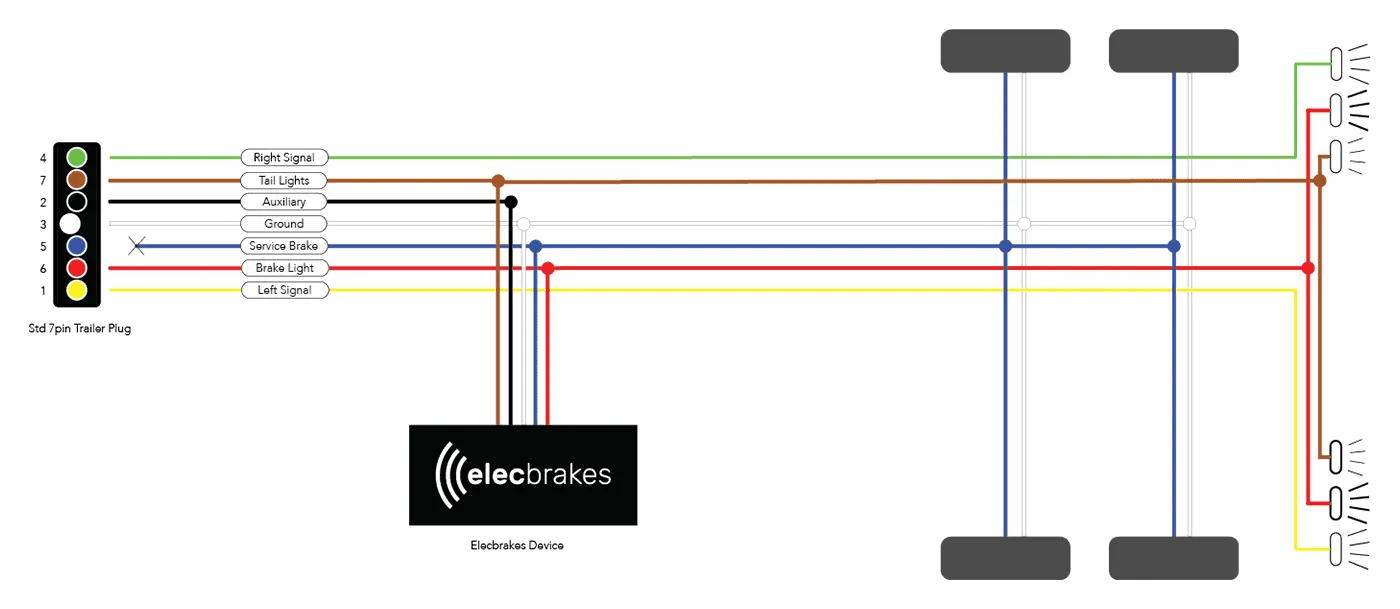Ditch Trailer Brake Lag: Upgrade to Electric Brakes Like a Boss
Tired of that white-knuckle feeling when towing your trailer downhill? Ever wish you had more precise control over your braking, especially in emergencies? If so, you're not alone. Many trailer owners are ditching their outdated surge brake systems and embracing the efficiency and safety of electric trailer brakes. This guide is your roadmap to a smoother, more controlled towing experience by upgrading to electric brakes.
For years, surge brakes were the go-to for trailers, relying on the momentum of the tow vehicle slowing down to activate the brakes. This system, while functional, can be clunky, leading to jerky stops and less-than-ideal control. Electric brakes, on the other hand, offer a more responsive and predictable braking experience. They operate using a controller in your tow vehicle, allowing you to apply the trailer brakes independently or in sync with your vehicle's brakes, resulting in a smoother, safer stop.
The shift towards electric trailer brakes is driven by a combination of factors: increased safety demands, advancements in braking technology, and the growing popularity of larger, heavier trailers. These brakes provide greater stopping power and control, especially crucial when towing heavier loads or navigating challenging terrain. Imagine descending a steep mountain pass with a fully loaded trailer; the confidence and control offered by electric brakes are invaluable.
One primary issue with traditional surge brakes is their inherent delay. The time it takes for the surge mechanism to engage the brakes can create a lag, increasing stopping distances and the risk of jackknifing, especially in slippery conditions. Electric brakes eliminate this lag, providing near-instantaneous braking response, leading to shorter stopping distances and improved stability.
Converting your trailer to electric brakes may seem daunting, but it’s a worthwhile investment in safety and peace of mind. This upgrade not only enhances your control but can also extend the life of your tow vehicle's brakes by reducing the strain placed on them. Plus, it opens up possibilities for towing heavier loads with increased confidence.
The history of trailer braking has evolved from basic mechanical systems to sophisticated electronically controlled systems. Electric brakes represent a significant leap forward, offering enhanced precision and control. They work by using an actuator at each wheel, connected to a controller in the tow vehicle. The controller modulates the electrical current sent to the actuators, applying the brakes with varying force depending on the driver's input.
One benefit is the increased control. Imagine towing a boat down a ramp; electric brakes allow for controlled, gradual braking, preventing the trailer from pushing the tow vehicle. Another advantage is the reduced wear and tear on the tow vehicle's braking system. By sharing the braking load, electric brakes extend the lifespan of your vehicle's brakes, saving you money on maintenance.
A third benefit is the improved safety, especially when towing heavier loads. The more responsive braking provided by electric brakes contributes significantly to overall safety, especially in emergency situations.
A simple conversion involves replacing the existing hubs with electric brake assemblies, running wiring from the brakes to a connector at the front of the trailer, and installing a brake controller in the tow vehicle. Kits are available to simplify the process.
Advantages and Disadvantages of Electric Trailer Brakes
| Advantages | Disadvantages |
|---|---|
| Increased control and responsiveness | Higher initial cost |
| Reduced wear and tear on tow vehicle brakes | More complex installation |
| Improved safety, especially with heavier loads | Requires a brake controller in the tow vehicle |
Best Practices: 1. Choose a quality brake controller. 2. Ensure proper wiring and grounding. 3. Regularly inspect and maintain the brakes. 4. Adjust the brake controller gain for optimal performance. 5. Use a breakaway kit for added safety.
FAQs:
1. Do I need a special hitch for electric brakes? No, your existing hitch should be compatible.
2. Can I install electric brakes myself? Yes, with mechanical skills and the right tools, it's a DIY project.
3. How often should I inspect my electric brakes? At least once a year, or more frequently with heavy use.
4. What's a breakaway kit? It's a safety device that automatically engages the trailer brakes if it becomes detached from the tow vehicle.
5. Are electric brakes required by law? Regulations vary by state and trailer weight; check your local laws.
6. How do I adjust the gain on my brake controller? Consult your controller's manual for specific instructions.
7. Can I convert only one axle to electric brakes? Generally, it's best to convert all axles for balanced braking.
8. Where can I buy electric brake conversion kits? Auto parts stores, trailer supply stores, and online retailers.
Switching to electric trailer brakes is an investment in your safety and peace of mind. It’s about more than just stopping; it’s about control, confidence, and ensuring a smooth, enjoyable towing experience. While there are initial costs and installation considerations, the long-term benefits of enhanced safety, reduced wear and tear on your tow vehicle, and increased control over your trailer make this upgrade a worthwhile endeavor. Start researching options, assess your needs, and consider joining online forums or consulting with experienced trailer owners. Take control of your towing experience and upgrade to electric brakes today.
Unveiling the difference portfolio vs cv what sets them apart
Unlocking your rewards a guide to your total rewards visa card account
A video of squidward why we cant stop watching














